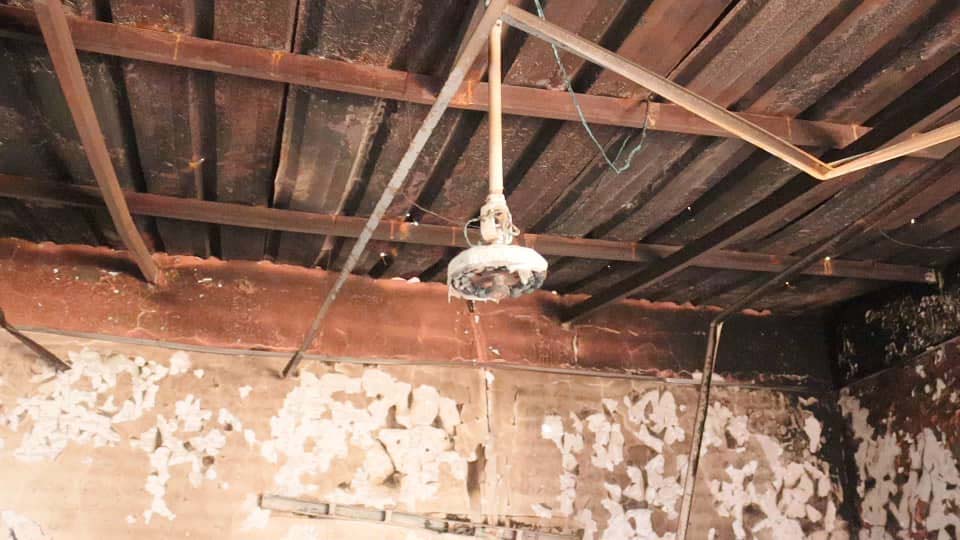170+ killed in Sudan conflict zones in December

Homes and shops in Burri in Khartoum destroyed by bombing (Photo: Saeed Abdelmajeed)
In its latest monthly situation report, the Sudanese Unified Human Rights Centre recorded at least 170 civilian deaths in the span of one month in several of Sudan’s conflict areas – Khartoum, El Gezira, Kordofan, and Darfur. New clashes were reported in Omdurman near the Engineers Corps in El Mohandesin.
In Khartoum and its sister cities, Khartoum North (Khartoum Bahri), and Omdurman, the Unified Human Rights Centre’s December situation update reports that at least 116 civilians were killed by artillery shelling this month alone.
The report, published on Tuesday, further shows that aerial bombardment in the El Debibad area of South Kordofan killed four people this month. In North Kordofan’s Jabrat El Sheikh and surrounding villages, the December toll reached 40 civilians dead and 14 others wounded.
In Nyala, capital of South Darfur, the army’s aerial bombardment claimed 10 lives and left 25 others injured within a month.
Attributing full responsibility for all violations in conflict areas to both warring parties—the Sudan Armed Forces (SAF) and the Rapid Support Forces (RSF)—the Unified Human Rights Centre emphasised the need for these parties to “facilitate the delivery of humanitarian aid, medicines, and maintenance for communication networks and services”.
Musab Hasan, a member of the Secretariat, echoed this demand in a call with Radio Dabanga. Hasan also urged the RSF to “stop incidents of theft and looting and to apprehend unruly people in El Gezira, ensuring their prosecution in a court of law”.
Omdurman
On Wednesday, Khartoum experienced a relative calm in military operations, while battles between the SAF and the RSF intensified in the areas of Omdurman, where the RSF shelled the vicinity of El the Engineers Corps.
Listeners told Radio Dabanga that El Mohandisin “is one of the most contested areas between the two sides”.
According to witness accounts, the SAF targeted RSF units in El Fitihab and El Salha in southern Omdurman. El Sawrat “witnessed continuous displacement to the north, as people try to avoid heavy artillery shelling.”
The RSF reportedly targeted concentrations of the SAF in the north of Omdurman “near El Hatana bridge in El Manara”.
Wad Madani
In a follow-up to their meeting with RSF officials on Tuesday, the Sons of Wad Madani Committee issued an appeal for “all doctors to head to El Gezira to treat the wounded”.
Committee member Tarig Adam spoke to Radio Dabanga of a severe shortage of health personnel in Wad Madani, the capital of El Gezira. “There are injured cases arriving at the hospital from nearby villages with gunshot wounds, as well as cases of chronic illness and childbirth that need immediate attention”.
As reported yesterday, the meeting between the committee and RSF officials resulted in an agreement to open and secure all hospitals and markets. Adam added that the parties agreed to “bring back those who fled El Gezira” and to “remove any forces occupying civilian homes” to establish security in the state.
The Sons of Wad Madani member described the current situation as safe, mentioning: “There are no bullet sounds; only sometimes you hear gunfire in the air.” He added that the streets were quiet, with “no roaming vehicles nor movement in the street, only RSF vehicles”.
The committee said it initiated its work in the eastern neighbourhoods of Wad Madani with some success, “but some shops remain closed” according to Adam.
Zalingei
The medical director of Zalingei Teaching Hospital in Central Darfur, Abdelrahman Abdallah, said that the hospital has resumed 30 per cent of its work capacity following its “destruction and looting in a comprehensive attack that impacted all its capabilities”.
Abdallah told Radio Dabanga that, in collaboration with the Ahl Zalingei (People of Zalingei) initiative, “the blood bank, the laboratory, emergency room, and most surgery departments have been restored”. However, he cautioned that the hospital still requires significant support, including emergency medicines, operational resources such as fuel, and compensation for workers.











 and then
and then